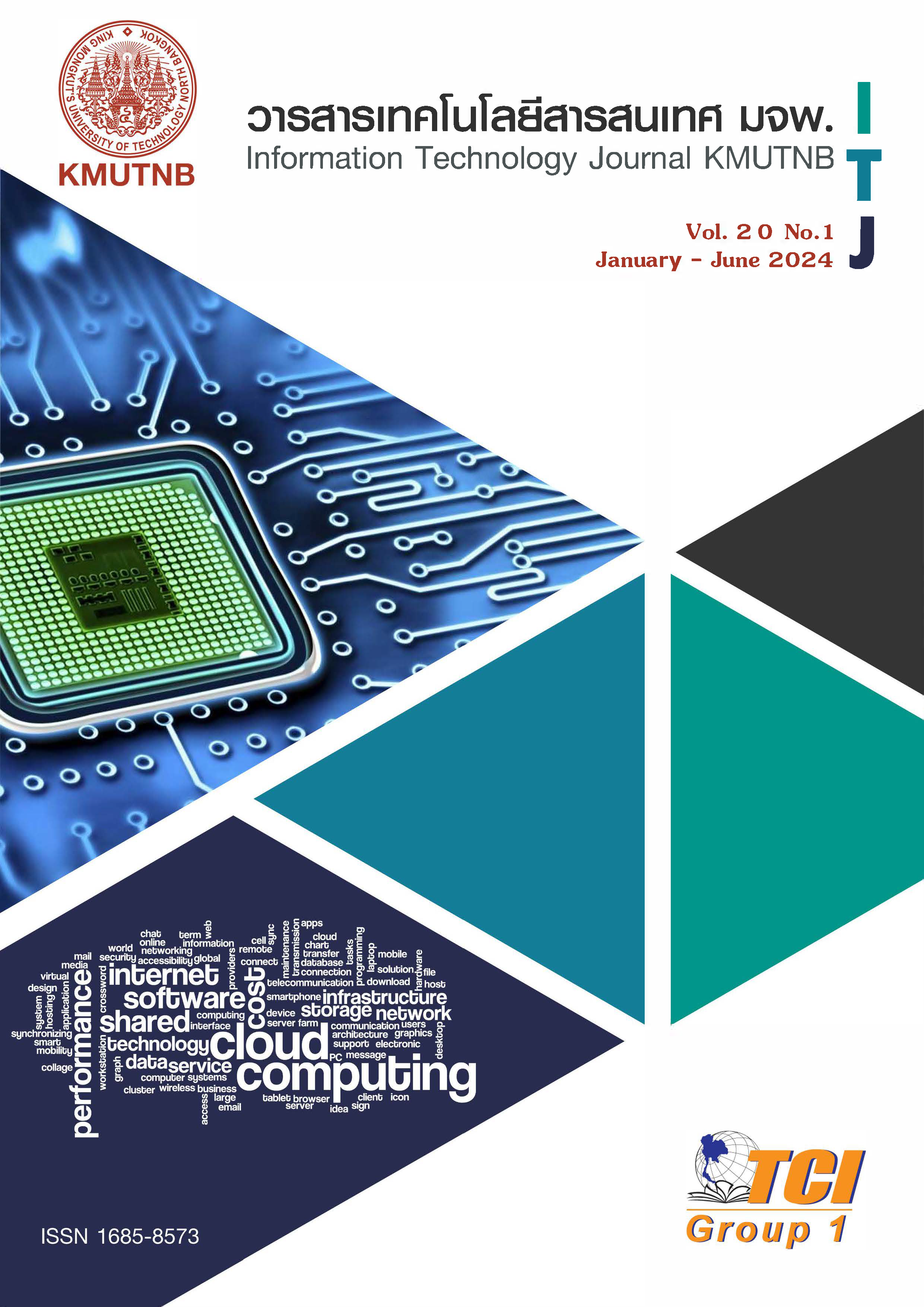A Personalized Food Recommendation System for Psychiatric Patients
Main Article Content
Abstract
The objectives of this research were to design and develop a personalized food recommendation system for psychiatric patients. The proposed system could be used as a tool for staff in hospitals with no nutritionists. The research methodology was based on System Development Life Cycle (SDLC) concept. First, collect patient data in the provinces of Nakhon Ratchasima, Chaiyaphum, Buriram, and Surin and determine the relationship between personal factors, e.g., gender, age, weight, height, waistline, blood type, and life elements. These factors have been taken into account with three mental disorders, namely schizophrenia, depressive, and mental and behavior disorders due to use of alcohol. Patients suffering from these three disorders must be given psychiatric medications that affect their appetite and nutritional needs differently. Finally, the IF-THEN rules were established and applied as conditions for the personalized food recommendation. The proposed system was developed as an easy-to-use web application. The results of the usability assessment indicated that the proposed system was appropriate for recommending personalized foods to psychiatric patients. Furthermore, the user provided the overall satisfaction results of the proposed system at a very good level. This system could be applied to other psychiatric hospitals or network hospitals in the community that are responsible for following up and treating psychiatric patients, but there were neither doctors nor nutritionists to recommend.
Article Details
References
O. Chawang, M. Klubwong, and N. Lomwong. "Development of Cognitive Flexibility and Inhibition Control Recovery Program on Coping in Patient with Schizophrenia." Nursing and Health, Vol. 3, No. 2, pp. 53-71, May-August, 2021.
M. Lakkanasirorat and S. Tirapat. "Health Behavior Modification with Family Participation among Overweight Psychiatric Patients with Diabetes Mellitus or Hypertension." Public Health and Health Sciences; TJPHS, Vol. 4, No. 2, pp. 67-82, May-August, 2021.
National Statistical Office, Number of Population from Registration by Age, Sex, Region and Province: 2021-2022, Available Online at http://statbbi.nso. go.th/staticreport/page/sector/en/01.aspx, accessed on 27 June 2022.
Nakhon Ratchasima Rajanagarindra Psychiatric Hospital, Annual Report 2019. Available Online at https://www.jvkorat.go.th/th/?p=1951, accessed on 27 May 2022.
K. Phankanok and P. Chupanit. "Nutrition Screening and Factors Associated with Malnutrition Among Community-Dwelling Older Adults." Community Public Health, Vol. 8, No.3, July-September, 2022.
K. Jayanama. "Sensory Alteration and Dietary Consumption in Elderly Individuals." Thai JPEN, Vol. 28, No. 1, pp. 64-74, January-June, 2020.
K. Chaiyasit et al. "The Role of Dietitian by the Royal Decree Designating Dietetics as one of the Disciplines of the Art of Healing Practices, 2563 B.E." Legal Entity Management and Local Innovation, Vol. 8, No. 9, pp. 389-400, September, 2022.
Department of Mental Health Ministry of Public Health, Annual Report 2019. Available Online at https://www.dmh-elibrary.org/items/show/189, accessed on 30 May 2022.
A. Ligêza. Logical Foundation for Rule-Based Systems. 2nd Editon, Springer Berlin, Heidelberg, 2006.
W. Khooriphan et al. "Comparison of Accuracy in Evaluation of ObesityUtilizing Fuzzy Rule-based Systems and Multinomial Logistic Regression of Workers in Mae Moh Power Plant, Lampang Province." Burapha Science Journal, Vol. 23, No. 2, pp. 1011-1028, July, 2018.
P. Onto et al. "Web Application SUKPRA for the Monk Self Care in 4.0 Society." MCU Peace Studies, Vol. 7, No. 1, pp. 96-110, January-February, 2019.
K. Vongvian et al. "Development of Food Consumption Planning Program for Chronic Kidney Disease, Nutrition Department, Loei Hospital." Science & Technology, Vol. 5, No. 1, pp. 24-31, January-June, 2019.
P. Thongyoo et al. "A Personalized Food Recommendation Chatbot System for Diabetes Patients." in Luo, Y. (eds) Cooperative Design, Visualization, and Engineering. CDVE 2020. Lecture Notes in Computer Science, Springer, Cham, Vol. 12341, pp. 19-28, October, 2020.
S. Samad et al. "Smartphone Apps for Tracking Food Consumption and Recommendations: Evaluating Artificial Intelligence-Based Functionalities, Features and Quality of Current Apps." Intelligent Systems with Applications, Vol. 15, pp. 1-16, July, 2022.
S. Puengsawad, S. Rungrongthong, and S. Temsiririrkkul. "Nutrition Recommendation for Elderly Using Mobile Application." H uachiew Chalermprakiet Science and Technology, Vol. 8, No. 2, pp. 19-32, July, 2022.
O. Aiemsirivong. System Analysis and Design, Bangkok, Thailand: SE-EDUCATION, ch. 2, 2017.
J. Nielsen. Why You Only Need to Test with 5 Users, Available Online at http://www.useit.com/alertbox/ 20000319.html, accessed on 27 May 2022.
R. A. Likert. New Patterns of Management, New York: McGraw-Hill Book Company Inc., 1961.
Thai Health Promotion Foundation, Special Diet Menu for Schizophrenic Patients to Help with Recovery. Available Online at https://www.thaihealth.or.th/เมนูอาหารเฉพาะโรค-จิตเภท/, accessed on 27 May 2022.
Bangkok Business Media, Korat Psychiatry has designed a menu specifically for 3 psychiatric diseases, giving double results. Available Online at https://www.bangkokbiznews.com/news/detail/845632, accessed on 27 May 2022.
N. Banmuang. Korat Psychiatry Designed a Menu Specifically for 3 Psychiatric Diseases. Available Online at https://www.banmuang.co.th/news/bangkok/ 161717, accessed on 27 May 2022.


